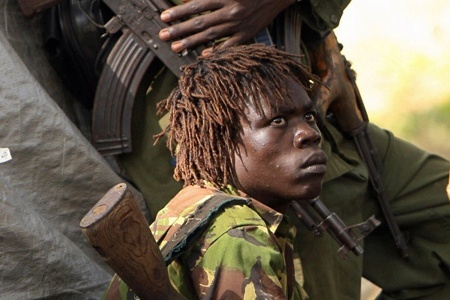
Uganda’s practice of pardoning and then integrating into its military captured or surrendered members of the Lord’s Resistance Army (LRA), getting them to hunt down their former comrades-in-arms, has come in for criticism by civilians affected by the rebel group in the Central African Republic (CAR).Report By Irin
“This strategy is a real insult to the victims,” said Gaétan Zangagoumé, chairman of a victims’ association in Obo, capital of Haut-Mbomou Prefecture. The area, in the extreme southeast of CAR, has been heavily affected by LRA activities. Victims there include hundreds of civilians forcibly conscripted into the LRA as well as people from villages repeatedly attacked, torched and now deserted. Fear of further attacks greatly restricts freedom of movement.
Zangagoumé said it is wrong to send former LRA members back to areas in which they operated, now as protectors. Civil society organizations like JUPEDEC (Youth United for Environmental Protection and Community Development), a local NGO working for a “inclusive” plan in the fight against the LRA in the prefectures of Mbomou and Haut-Mbomou, agree.
“At a meeting we organized, a female victim recognized among the Ugandan forces a former LRA rebel who had raped her. He even wanted to court her. She told us this; it is a difficult situation,” said Alexis Lewis Mbolinani, the NGO’s coordinator.
Arms not enough
In Kampala, Uganda’s military spokesperson Col Felix Kulayigye told IRIN that LRA fighters in CAR “who are captured in action or surrender to us are allowed to make a [decision] whether to join us or [whether they] want to go home. There is no secret about it. This happens for reconciliation purposes.”
A Ugandan officer in CAR, speaking on the condition of anonymity, said, “They are deployed in the field because they are more familiar with the terrain and areas where [LRA rebel leader Joseph] Kony’s bases are.”
JUPEDEC believes civil society should play an important role in the hunt for Kony. The idea, it says, is to involve many actors in the fight: Civil society, the church, the army and local authorities must be mobilized to call for LRA members to defect because the rebellion cannot be ended by force of arms alone.
- Chamisa under fire over US$120K donation
- Mavhunga puts DeMbare into Chibuku quarterfinals
- Pension funds bet on Cabora Bassa oilfields
- Councils defy govt fire tender directive
Keep Reading
“The more we multiply military attacks, the more we aggravate the situation of the civilian population; hence the need to focus on encouraging defections. The LRA has been in existence for 26 years, and armed response has not been able to stop it,” Mbolinani said.
Civilians neglected
Civilians who have escaped LRA captivity in Haut Mbomou have formed self-help associations. The parent organization in Obo has 232 members; others have been set up in the towns of Zemio, Mboki, Bambuti and Djemah, with memberships ranging from 60 to 200. According to Kulayigye, the Ugandan army has freed 800 CAR civilians from the LRA.
The associations hope to attract government or foreign assistance, but sometimes donations turn out to be useless, according to Zangagoumé.
The ruins of a house that was torched by LRA fighters in Nguili-Nguili village, close to Obo Town One NGO “has just donated a welder without providing a generator. I do not know how a machine of this kind can operate without a generator in a town without electricity,” he said, lamenting the omission of victims’ needs from efforts to eradicate the LRA.
Amnesty International Central Africa researcher Godfrey Byaruhanga made a similar point in a June 2012 report from Obo: “The international community appears to be more interested in the infamous Kony and his LRA outfit than in their many victims in CAR and other countries in the region. The LRA threat will hopefully diminish and eventually disappear – with Kony and other LRA leaders brought to justice – but the victims will remain.”
But civilians affected by the LRA in southeast CAR are not entirely without help.
COOPI, an Italian NGO, offers psychological counselling and training in livelihood skills. And earlier this month, the US Agency for International Development (USAID) – which provides some humanitarian and reintegration assistance in southeast CAR – launched a three-year programme to provide small grants to LRA-affected civilians to “develop and implement security plans and reduce their isolation and vulnerability through communications technology and skills-building.”
26,000 internally displaced
LRA violence first reached southeastern CAR in 2008. According to the UN Office for the Coordination of Humanitarian Affairs (OCHA), there are currently some 26,000 internally displaced persons in the southeast.
In October 2011, the US government sent military advisers to support CAR and Ugandan armed forces in their fight against the LRA.
Similarly, the African Union is in the process of establishing a regional anti-Kony force composed of 5,000 men from the four countries affected by LRA activities. Last September, CAR provided 450 men, South Sudan 500 and Uganda 2,000. The Democratic Republic of Congo has yet to make any troops available.








